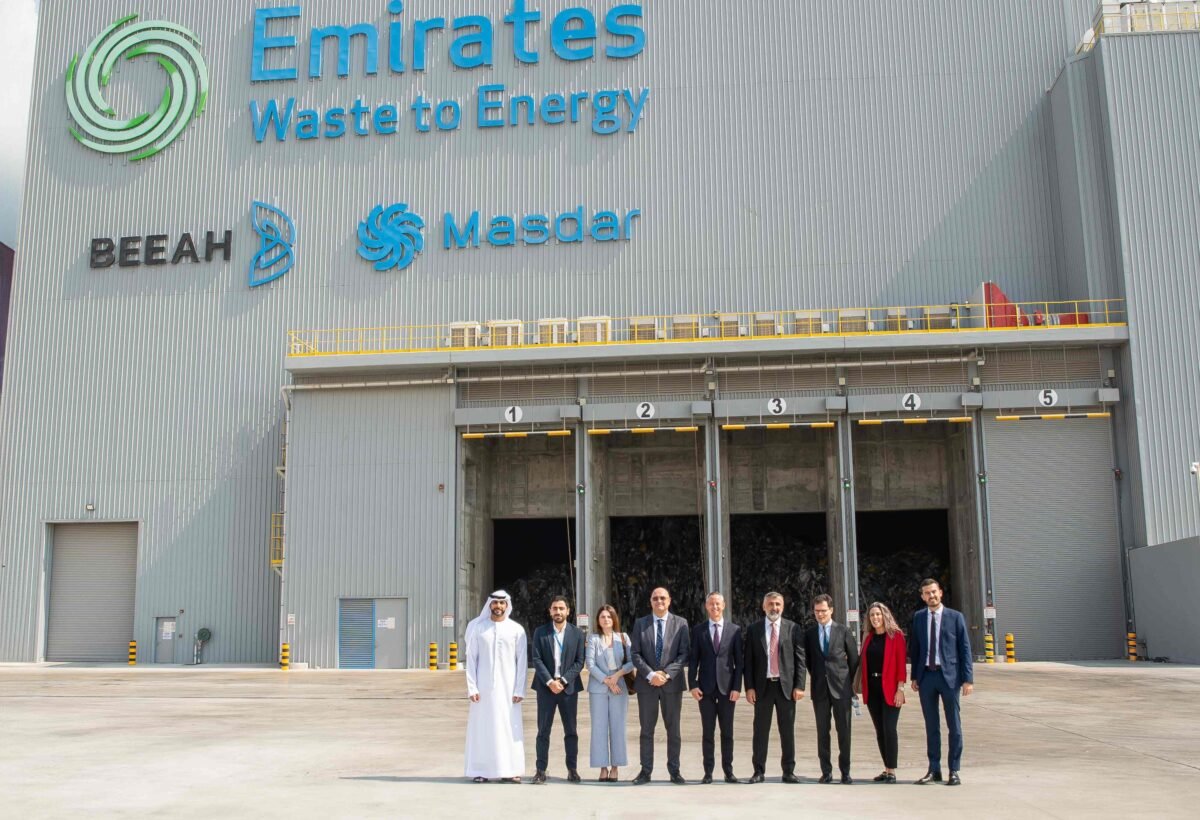Veolia is evaluating the potential for a second waste-to-energy (WtE) plant in Sharjah, as it aims to expand its regional footprint in sustainable waste management.
The global environmental solutions provider is capitalising on the growing demand for WtE technology, which offers a dual benefit of reducing landfill use while generating energy.
With Sharjah’s current WtE plant already diverting 90% of the city’s waste from landfills, a second facility would target processing the remaining 10% of waste to contribute to the emirates’s zero-landfill goals, according to a senior executive at Veolia.
“We see more opportunities to enhance our waste management capabilities in the UAE and elsewhere, especially with the increase in waste production,” said Philippe Bourdeaux, Executive Senior Vice President for Africa and the Middle East at Veolia.
“Sharjah has demonstrated the viability of waste-to-energy solutions, and the increasing waste volume makes a second plant not only feasible but necessary for the region’s growing needs.”
The Sharjah Waste-to-Energy Plant recently achieved a major milestone, processing 500,000 tonnes of waste since its launch in 2023.
Operated by Emirates Waste to Energy, a joint venture between BEEAH and Masdar, the plant is the first of its kind in the region. Veolia is responsible for managing the facility under a 25-year agreement, adhering to international standards.
The plant currently generates 33 megawatts (MW) of electricity, of which 30 MW is exported to the grid, powering up to 28,000 homes and offsetting 450,000 tonnes of CO2 annually. The plant has also abated 750,000 tonnes of CO2 and recovered 2,000 tonnes of metal since its operations began.
Veolia, which played a key role in this success, is now eyeing opportunities to develop similar waste-to-energy projects in new markets across the Middle East and Africa.
Speaking to Utilities Middle East on Monday, during a site visit of the plant in Sharjah’s Al Sajaa area, Bourdeaux pointed out that to manage the additional waste sustainably, the company would need to replicate or adapt the design of existing plants to meet the region’s specific needs.
Bourdeaux stressed the need for thorough commercial studies to assess the viability of the projects, particularly as the population grows and waste volumes increase.
“The challenge is primarily financial,” he noted. “While the technical aspects of expanding are not complex, the significant capital investment needed raises questions about the right timing.”
Veolia also expects rapid advancements in WtE efficiency to bring down the costs, predicting that the levelised cost of electricity (LCOE) of generating power from waste will soon rival that of solar and wind power.
Globally, WtE remains more expensive than wind and solar, with the LCOE averaging between $70 and $120 per megawatt-hour (MWh), compared to utility-scale solar at $49/MWh and onshore wind at $33/MWh. However, Veolia’s projections suggest this gap is closing fast.
Key advancements in gasification and pyrolysis, which convert waste into cleaner energy with lower emissions, are driving WtE’s cost efficiency.
Veolia’s investments in these technologies will bring major improvements in energy output and waste management, which could reshape the region’s power generation sector, according to Aidan Kennedy, plant director for the Sharjah Waste-to-Energy Plant.
“While generating energy from waste may not be the cheapest option, especially compared to fossil fuels, waste-to-energy is still a competitive energy source. It is reliable and serves as a base-load power provider,” said Kennedy.
The plant in Sharjah is equipped with cutting-edge technology to ensure both high efficiency and minimal environmental impact. It includes a CNIM boiler with a unique four-pass system and a Martin grate with a 5-run design which ensures optimal combustion control. The LAB flue gas treatment system further minimises emissions, supporting the facility’s role to reduce environmental impact.
The Sharjah WtE plant processes about 1,000 tonnes of waste daily, using a storage pit with a capacity of 5,000 tonnes to ensure a steady supply for combustion. The facility enhances combustion by blowing hot air onto the waste, allowing for complete combustion that minimizes soot and smoke emissions.
The heat generated is used to produce steam, which drives a turbine for electricity generation. Advanced scrubbers and cleaning systems are used to ensure emissions comply with strict European environmental standards.
Countries like Singapore and Sweden have already integrated WtE into their energy grids, demonstrating its potential to reduce landfill waste while generating consistent, base-load power.
In Dubai, the Warsan Waste-to-Energy plant, developed by Besix in collaboration with Hitachi Zosen Inova (HZI) and other partners, recently commenced full commercial operations.
As the world’s largest waste-to-energy facility, it will process 2 million metric tonnes of waste annually to generate electricity, enough to power 135,000 homes.
Meanwhile, Abu Dhabi has signed concession agreements for its first Waste-to-Energy project, a 900,000-tonne facility led by Marubeni. The plant will generate 80 MW of power, with Emirates Water and Electricity Company (EWEC) purchasing the electricity for the next 30 years.
Also, plans to establish a complementary waste-to-hydrogen plant next to Sharjah’s current facility are advancing. BEEAH, Chinook Hydrogen, and Air Water Gas Solutions have signed a joint development agreement to build the world’s first commercial-scale plant converting waste into hydrogen.
Building on earlier demonstration success, the new facility will use advanced gasification to transform waste, such as non-recyclable plastics, into green hydrogen.
Veolia has established a major presence in the Middle East and North Africa, generating a substantial turnover with around 68,000 employees across Turkey, Egypt, and the GCC. Veolia Environnement (Paris Euronext: VIE) reported consolidated revenue of $48.9 billion (€45.4 billion) in 2023.
The company is focusing on enhancing its core areas of water management, waste management, and decarbonised energy.
Bourdeaux said that the company’s mission is to become the world champion of ecological transformation. “Our primary goals are to decarbonise the planet, regenerate resources, and combat pollution,” he said.
Veolia currently operates the world’s largest waste-to-energy plant in Istanbul, which processes 1 million tonnes of waste annually and relies on selling power to the national grid for profitability.





